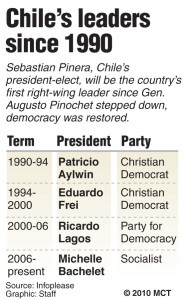Moderately Extreme: Ideological Flexibility in Latin American Politics

At the turn of the new year, Chile and Brazil seem to be in the best economic shape of all the Latin American nations. That means the two countries are probably run in similar fashion, right? Wrong.
Well, sort of wrong. Roughly one year ago, Sebastián Piñera, a conservative businessman who saved his country from impending financial crisis by introducing the credit card in the 80s, was elected president of Chile. The country had not willingly elected a conservative leader in decades.
On the other hand, several months ago, Dilma Rousseff was elected the first female president of Brazil, taking over for Lula and likely continuing his liberal policies. The current political situation of each nation seems to be ideologically opposite—do they share anything in common?
This requires us to look into the last few decades for historical context and to look more closely at the policies of each president. General Augusto Pinochet ruled Chile from the mid-70s and through the 80s in a right-wing, US-backed authoritarian regime. After the Chilean people finally ousted the junta in 1990, it should come as no surprise that the painful legacy of Pinochet was followed by two decades of left-wing leadership, even during the heyday of neoliberalist thought.
 It was not until Chileans elected Sebastián Piñera last year that they finally overcame their fear of conservative leadership. To many, he has proved himself to be worthy of Chile’s trust. Although he considers himself to be a “passionate conservative,” Piñera has promised to continue some of the liberal policies of his predecessor, Michele Bachelet, which sparked Chile’s rapid economic growth. As of yet, Piñera has lived up to these promises, continuing Bachelet’s social welfare program to assist Chile’s poorest citizens.
It was not until Chileans elected Sebastián Piñera last year that they finally overcame their fear of conservative leadership. To many, he has proved himself to be worthy of Chile’s trust. Although he considers himself to be a “passionate conservative,” Piñera has promised to continue some of the liberal policies of his predecessor, Michele Bachelet, which sparked Chile’s rapid economic growth. As of yet, Piñera has lived up to these promises, continuing Bachelet’s social welfare program to assist Chile’s poorest citizens.
Many blame corruption and U.S.-enforced adherence to neoliberalism for leading Brazil into economic collapse in the 80s and 90s. Brazilian leaders struggled with reviving the faltering economy until Fernando Cardoso, a conservative leader, came to power in the mid-90s. The country still faced heavy financial woes under Cardoso, but he also espoused some liberal policies under his leadership, paving the way for Lula’s election in 2002.
While still hampered by severe wealth inequalities, Brazil under eight years of Lula has seen vast economic growth thanks to his adaptive policies. Lula called himself a socialist and by all means is one, although not the type of socialist that American right-wing pundits fear. Instead of having the state own all aspects of the economy, Lula looked at every sector of the economy and determined how much control the state should have, giving it much more control in some areas and very little in others.
Lula was geared towards socialism, but simultaneously used Brazil’s surplus money to subsidize individual consumption via neoliberal policies. Many expect Lula’s successor and as some have said, potential puppet, Dilma Roussef, to continue this type of adaptive socialism.
I know I am lucky to live in the United States, but I can’t help but wishing sometimes to live in a country where politics is motivated by success, not partisanship. I myself am fairly liberal, but I’d rather have a conservative president like Piñera than a liberal president who is more focused on shunning conservatives than working with them to create the best results. I would rather have a president who can adapt the beneficial policies of the opposition into his or her own policies rather than being dogmatically partisan.
Don’t confuse this for Obama-bashing, though, because President Obama does seem to be trying to cooperate with Republicans in Congress (Democrats in Congress are a different story, though). This is more American politics-bashing in general. We would likely be in the same impossible situation if we had a conservative president right now. He and his congressional majority would be fending off liberals until Americans realized nothing was getting done, then liberals would be elected into a Congressional majority and into the presidency, and so on.
Politics is simply different in the United States than it is in Latin America. For one, the political spectrum in Latin America is far, far broader than what Americans are used to. Socialism does not mean the same thing in Latin America that it does here. Neoconservatives call Obama socialist, but the American spectrum is so tight around the center that in many ways, Obama is just barely liberal with respect to the rest of the world.
Many democratic countries in Latin America and elsewhere around the globe, most with a much smaller population than that of the United States, have many major political parties, and sometimes as many as dozens. We have over 300 million people but only two major parties. It’s no wonder that our ideological landscape is so limited—how can two parties embody the ideals of so many people? Will our two-party system ever be scrapped? I doubt it. Or, at least, not any time soon.
I am not insinuating that nothing ever gets done in the United States. To do so would be silly. On the other hand, our political system is highly inefficient, and the nation could aspire to be much more if American policymakers looked at how other democratic nations such as Brazil and Chile have progressed. These two countries have overcome their fears of the political “other,” showing what it means to be adaptive and flexible on the political stage. I will be eagerly following Piñera and Roussef in the coming years, and would love to see the two presidents continue to lay the foundations for long-term success in their respective nations.
In my next column I will discuss Turkey’s bid to join the European Union and how the final outcome, no matter what it may be or even if there ever will be any final consensus, will have profound effects on global relations.